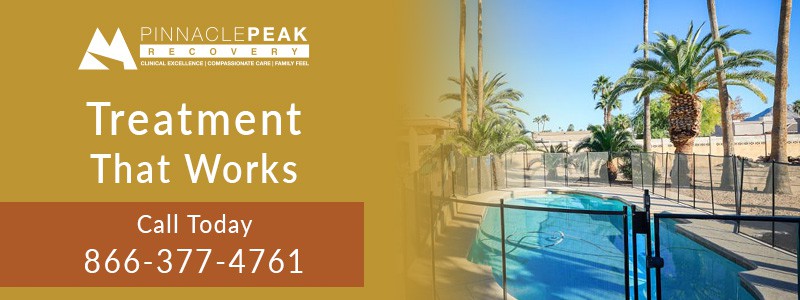If you’re currently going through the process of choosing a rehab or looking for other resources for you or a loved one, you’re probably overwhelmed due to how many different options are out there. We've made this process a little easier and included a list of helpful resources you can access here in Arizona, and the most important qualities you need to look for in a quality rehab.

Ok, so now you have this huge list of resources, but how do you sort through them? Or if you decide you want help that goes above and beyond what most free or low-cost services can provide, how do you identify a quality program? Our guide below gives you the criteria you need to keep in mind.
Accredited Staff/Program

Perhaps one of the most important things to look for is the quality of the staff. The staff of a treatment facility are the people who you or a loved one will be interacting with the most during treatment, and you want to make sure they’re licensed and highly trained. One of the major reasons that top-rated rehabs are so successful is that they have the best staff.
It’s also important to know if these staff members are there full or part-time. Many centers will only have psychiatrists visit with patients once a week as they have expensive salaries. The best programs have them full-time on staff and regularly working with patients. If the workers are mostly part-time, it does not allow for complete access to their attention.
These staff members also must be licensed so they have the power to prescribe and dispense medication which could be a vital part of the treatment process when dealing with mental health issues.
Many centers only use CADCs or other lower level counselors with maybe a 2-year certificate. They are not licensed to practice mental health. You need at least a master’s and many hours of clinical experience so it’s crucial that a dual diagnosis center has an LMFT, LCSW, psychiatrist, etc. on staff.
Many addiction treatment facilities undergo a process of accreditation in addition to meeting state licensure requirements. Accredited facilities have undergone rigorous evaluation by a respected third-party organization. Official approval from the Joint Commission Accreditation for Addiction Treatment (JCAHO), or the Commission on Accreditation of Rehab Facilities (CARF), is generally a good sign that the treatment facility is operating according to high standards.
A Focus on Underlying Issues

For most who suffer from addiction, the addiction is the result of other underlying issues, especially mental health. According to the Substance Use and Mental Health Services Administration, as many as 40% of people struggling with addiction also have a mental health disorder (and this is only counting those that have been properly diagnosed). If underlying issues are not addressed during treatment, they will continue to be a problem in recovery.
Those with untreated underlying issues are much more likely to relapse, as the reason behind their addiction is still causing them problems. One thing that all great centers have in common when treating co-occurring disorders is the fact that they have a primary focus on overall mental health, not just the addiction. Most of these rehabs offer treatment that includes cognitive behavioral therapy, EMDR, trauma-informed care, and family therapy. All of these treatment options can make the chance of long-term recovery much greater.
Mental health is something that needs constant work and attention. Quality centers will teach you how you can keep your mind healthy through daily exercises like meditation, therapy techniques, and mindfulness.

Individualized Treatment Is Necessary to Recover
Everyone has a different history and different ways for dealing with addiction. Everyone who goes to our Scottsdale drug rehab has their own unique diagnosis that is different to everyone else. Any program that doesn’t acknowledge this will have limited effectiveness.
Effective addiction treatment is individualized per the needs of the patient. Quality treatment addresses multiple facets of one’s addiction, including any medical, psychological, or social issues. Effective treatment is also tailored to the individual’s age, ethnicity, gender, and culture. A customized treatment program will offer a combination of services to match the patient’s unique needs. For example, a patient with co-occurring disorders (an addiction and other mental health issues) may require a very specific therapeutic approach that may not be right for another patient.
The facility you choose should do a thorough evaluation of your condition and create an individualized plan that recognizes and takes into account your personal stressors and supports, as well as what did or did not work for you in previous recovery attempts.
Aftercare Planning
People looking for treatment get so focused on their time in rehab that they forget to ask about any aftercare that is available. The recovery process extends well beyond the first 30, 60, or 90 days of treatment. Longer engagement in treatment, including aftercare, has many proven benefits, such as fewer relapses and better social functioning. In fact, over 71 percent of people who engaged in aftercare for nine months or longer were sober at one year, compared to just 48 percent who participated for six months and 37 percent who participated for three months.
Great centers will have a strong aftercare program in place especially when dealing with dual diagnosis cases. Mental health issues take time to treat and more assistance will be needed than just a 28-day stay at the facility. Determining the quality and success of aftercare programs at a rehab can be one of the most important factors to consider when searching for long-term recovery for you or a loved one.
Where Your Loved One Can Seek Addiction Treatment

Pinnacle Peak Recovery is dedicated to providing Clinical Excellence, Compassionate Care, and a Family Feel. Call Pinnacle Peak Recovery today at 866-377-4761 to help your loved one receive the treatment they deserve.
Resources In Arizona
To make this research process a little easier for you, below we have provided a list of resources to help you or a loved, specifically in Arizona. These resources displayed here have consistently shown themselves to be wholly committed toward educating, guiding and ultimately helping the public in numerous ways. Many are also free or low cost.
Government Resources
- Arizona Department of Health Services (Div of Behavioral Health)
- Governor's Office of Youth, Faith and Family
University Resources
- ASU Counseling
- ULifeline- Online Resource for College Mental Health
- NAU Counseling Services
- The University of Arizona’s Online Alcohol Screening Program
- Friend2Friend- How to Help a Friend Struggling With Drug Use
Resources In Phoenix/Scottsdale
- Salt River Intergroup of Alcoholics Anonymous
- Narcotics Anonymous at Lambda Phoenix Center
- 12-Step Support Groups- North Scottsdale Fellowship Club
- Co-Dependents Anonymous Meetings in Phoenix
- Co-Dependents Anonymous Meetings in Scottsdale
- Substance Use Private and Group Counseling in Scottsdale
Resources In Tucson
- Co-Dependents Anonymous Meetings in Tucson
- Celebrate Recovery Meetings- Tucson Central Church of the Nazarene
- Gender-Specific Support Groups for Addiction in Tucson
- Tucson Alcoholics Anonymous
- Narcotics Anonymous Meetings in Tucson
Specific Gender, Religion, Sexual Orientation, etc. Resources
- Arizona Jewish Family and Children’s Services
- Native American Connections in Arizona
- Lambda Phoenix Center- Offering Hope to the LGBTQ Recovery Community
- Substance Use Prevention and Treatment Block Grant Providers- If you or someone you know needs help accessing substance use treatment, and do not have insurance through the Arizona Health Care Cost Containment System (AHCCCS), help may be available through services funded by the Substance Use Prevention and Treatment Block Grant (SABG).
Support Groups
- Alcoholics Anonymous in Arizona
- Secular Alcoholics Anonymous in Arizona
- Cocaine Anonymous- Arizona Area
- Celebrate Recovery- Christian based support meetings in Arizona to help people obtain freedom from their hurts, hang-ups, and habits
- LDS Family Services Arizona- Offers free substance use and sexual addiction support groups
- Arizona Region of Narcotics Anonymous
- Arizona SMART Recovery
- Arizona Women for Sobriety
- Arizona Buddhist Recovery Meetings
- White Bison- A recovery community created for and by the Native Americans and Alaska Native communities in Arizona
Arizona Hotlines
- Alcoholics Anonymous- 602-264-1341
- Al-Anon- 602-249-1257
- Cocaine Anonymous- 602-279-3838
- Co-Anon- 602-697-9550
- CoDA- 602-277-7991
- COSA- 480-385-8454
- Crystal Meth Anonymous- 602-235-0955
- Families Anonymous- 602-647-5800
- Heroin Anonymous- 602-870-3665
- Marijuana Anonymous- 800-766-6779
- Narcotics Anonymous- 480-897-4636
- Nar-Anon Family Groups- 800-477-6291
- 24/7 Addiction Recovery Helpline- 866-394-1952
Looking for a quality program covered by insurance instead? Pinnacle Peak Recovery is dedicated to providing Clinical Excellence, Compassionate Care, and a Family Feel. Call Pinnacle Peak Recovery today at 866-377-4761 to help your loved one receive the treatment they deserve.


